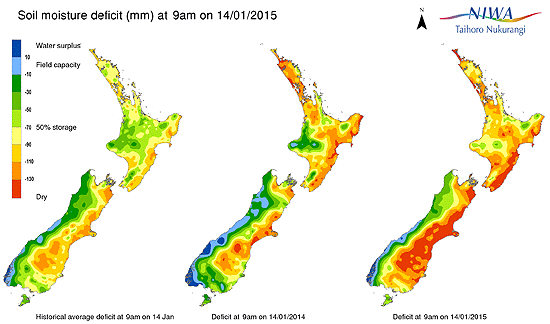
Here's our summary of the key overnight news.
The World Bank cut its global growth forecasts for both this year and 2016 citing weak economic prospects in the eurozone, Japan, and emerging economies such as Brazil, Russia and even China, with these offsetting the benefits of lower oil prices.
The World Bank predicts global GDP of 3% in 2015, below its 3.4% forecast made in June. Growth will then rise to 3.3% next year versus June's forecast for 3.5% growth. The World Bank then picks 3.2% growth for 2017.
World Bank chief economist Kaushik Basu described the global economy as being "at a disconcerting juncture," and now being "as challenging a moment as it gets for economic forecasting." Basu also said the global economy was running on a single engine, "the American one."
US sharemarkets fell off the back of the lowered World Bank forecasts, and as US retail sales for December recorded their largest decline in 11 months. US retail sales fell 0.9%. And European shares also fell.
The weaker global growth outlook, falling oil prices and soft US retail sales sent sovereign bond yields lower in the US, Britain, France, Canada and Japan. Thirty year US Treasuries fell to a record low yield of 2.39% with speculation a Federal Reserve interest rate increase could be as far away as December.
Fed fund future contracts now see a better than 50% chance the first Fed rate increase won’t happen until the final quarter of 2015. At the end of 2014 a September hike was foreseen.
Meanwhile, the World Bank outlook also sent commodities lower led by copper, which had its biggest drop since 2011. Copper futures for March delivery fell 5% to US$2.5125 a pound. West Texas crude oil was little changed at US$45.88 a barrel.

JPMorgan Chase CEO Jamie Dimon has claimed banks are "under assault" after his bank reported a 6.6% fall in fourth quarter profit as legal expenses hit US$1.1 billion. In November JPMorgan agreed to cough up US$1 billion in penalties stemming from its conduct in foreign exchange markets. Investigations into that area and others such as alleged manipulation of Libor interest rates, continue.
And Bank of England Governor Mark Carney has told British MPs Scotland’s economy is likely to be harmed by the falling oil price, but much of the effects will be offset by Scotland's position within the UK. His comments come just months after Scots narrowly voted to remain within the UK.
The New Zealand dollar is at about US77.19 cents this morning, about AU94.79c, and the Trade Weighted Index (TWI) is at 79.0.
You can see details on economic data releases in our Economic Calendar here »
Our daily subscriber email will return next week. For details, including how to subscribe, see here.
Daily exchange rates
Select chart tabs
17 Comments
Even US Fed starts to worry about low oil prices hitting US economy (via the dislocation of the shale oil ponzi):
WhinyKing: You do realise that the current oil prices are going to save the US about $200 billion a year on imports, don't you? The shale oil and gas industry is the best investment ever made. Every person on the planet will benefit.
Hope all is well in your cave. :) Keep your ammo dry.
$200 billion saved on imports!?! What madness is this?!
I thought everyone has been telling us that the USA is 'energy independent' now!
Why would they need be importing so much oil if they are 'energy independent' and were recently dubbed 'Saudi America' by the MSM?
Are you telling me the MSM has been was lying to us with the 'energy independence' meme!? Well I never....
"The shale oil and gas industry is the best investment ever made. Every person on the planet will benefit."
What a rediculous thing to say. Unless you are talking about the rising tide lifting all boats analogue. You do realise that rising sea levels are not much chop for people in coastal areas as land dosn't float.
Considering the mounting oil men layoffs, secondary work cancelations, impacts to state budgets, the amount of pension funds, investors and specualtors in the junk bond market that stand to lose a lot of $s the OTHER side of the coin looks far worse, in fact NET far worse.
We get to see whos right this year, maybe within 6 months even, sit back and watch.
So Steven you think that some time this year will be the start of the next Great Depression? If you had several hundred thousand cash invested in term deposits and no mortgage what would you do to protect it? Not keen on taking an OBR haircut and all the Kiwis who have billions in term deposits could also do with some advice.
hindsight is 20:20.
I guess historians will look back at this time like they have the Great Depression and say the 1929 stock market crash and say it started "here". So, July 2008 when oil crashed from $148? or is "here" peak oil which was 2006? when oil started to rise in price in 2004? or when we see a financial nose dive? into 2009? now in 2015?
Do I think its going to happen in 2015? Im not going to say that. I sold all my shares in 2010, bailed out, reduced debt, 4~6 years too early so my timing sucks. Debt of course remains after the event, wealth wouldnt have.
"OBR haircut" I think I commented earlier that there will be no simple strategy to avoid capital loss. The thing is no ones knows exactly how this will play out, or how fast or if it even will. There is also more than just the OBR, a Lehman moment is even more catestrophic and way faster in occuring I suspect (I think they said 2 or 3 days to global finance freeze, ie no functional banks).
I cant see how I can or are prepared to advise, I simply do not know financial detail, or whats ahead of us, but high level things to consider,
Internal effects, eg our housing market or dairy farming bubble implodes.
External effects, eg a Lehman moment.
Problem is the strategy might be different for both. and which occurs first? just one? both?
a) the NZ housing bubble collapsing should be observable, occuring over some months?
b) A Lehman moment when some major banks fail and the banking system goes south over a week or weekend ie very fast?
or all the other "black swan events" that could do it?
Surely there are competant professional advisers out there who can advise how best to protect against the OBR?
I would if it was me remain in a highly liquid state, on call account type things and be prepared to move into or already in Govn short term bonds ( less than 2 years, probably 1 year) . Of course then you get little interest and most ppl wont accept that. My savings small as they are are in on call accounts, if I thought or when I see a) happeneing I'll extract cash and dump the rest into the mortgage as debt remaining and being harder to service is a certianty.
After the banks have been OBR'd are they then safe to put money back into? I have no idea, does anyone?
At some stage you dont want to be in Govn bonds? as the Govn will probably default? guess you do not.
By then housing will have dropped significantly in value, say 60~75% do you then buy property as its a real asset? How do you get an income? assuming mass un-employment and a Govn taht cannot pay ie how many ppl however can afford the rent?
oh boy do you open a can of worms when you start to look at it.
Just who as a professional is sitting down and strategising this? bet not many.
If I had say $200,000 I would go to a professional and ask him how best to avoid the OBR, and a Lehman financial log jam. I'd assume he'd say short term Govn bonds maturing inside 2 years. Maybe even ask another professional as a cross check.
The Q is what do you do after that?
bigblue..
Steven does not want to give a definative answer... so i will.
There will be no great depression in 2015...
I'm fully invested in real Estate ( Auckland )...I see no reason to change that view in 2015...
In europe they are even talkinng about helicopter money.
http://www.spiegel.de/international/business/economists-say-handing-out…
Auckland Real Estate is not in a bubble.... I dont see any signs of Bubble like speculation.
Aggregate credit growth is modest....
i think NZ will have an ok yr.... there will be no Bank Failures... not this yr nor next yr..
europe is a different story.... They are in some kind of depression....
I highly recommend Ray Dalio and Gary Shilling in regards to understanding the Global Climate of "deleveraging"....
It is not quite the depression...end of times... event that Steven might suggest.
ALSO.... even in the inflationary 70s, commodity prices were very cyclical...very volatile.. Maybe that is the nature of commodity supply /demand....speculation..??? i'd be cautious in thinking it is the great sign of the deflationary global implosion..
Roelof - I'm not so sure about the Akld property market, hopefully when it finally comes it will be a long-term slow correction, but that's not how markets typcally work so I suspect we won't get that), but I agree totally with the the rest of the sentiments. But for those that are concerned to the extent that bigblue suggests, if you want to avoid equities, bonds, property and OBR risks in the event of a major collapse, then there is only one place to go. and that is to have a well calculated amount of your investment portfolio sitting in gold. It performs well in both inflationary and deflationary environments, and has no counterparty risk, and has had a nice 30% correction in USD terms. In a crisis, which is when it peforms best and the only reason you've got it, it becomes the obvious route when all others including bank deposits have question marks against them,
Swiss Bank removes support level for the Euro - this will explain why NZD strengthened against the Euro overnight. Should be big news internationally http://www.cnbc.com/id/102341460


We welcome your comments below. If you are not already registered, please register to comment.
Remember we welcome robust, respectful and insightful debate. We don't welcome abusive or defamatory comments and will de-register those repeatedly making such comments. Our current comment policy is here.